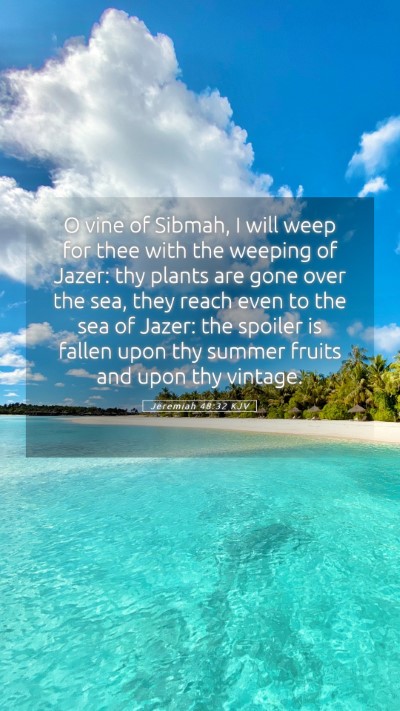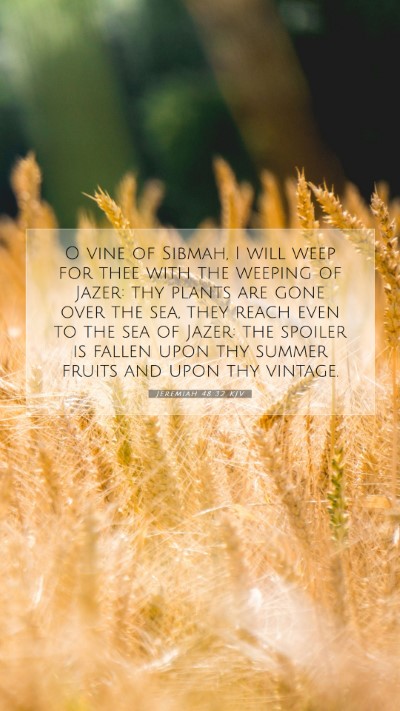Understanding Jeremiah 48:32
Jeremiah 48:32 states: "O vine of Sibmah, I will weep for thee with the weeping of Jazer: thy plants are gone over the sea, they reach even to the sea of Jazer: the spoiler is fallen upon thy summer fruits and upon thy vintage." This verse is part of God's prophecy against Moab, signifying judgment and lamentation over the destruction of their vineyards.
Bible Verse Commentary
The insights from renowned public domain commentaries provide a deeper understanding of this verse. Below are summarized meanings, interpretations, and applications to enrich your Bible study:
-
Matthew Henry's Commentary:
Henry emphasizes the significance of Moab's vineyards, which were known for their abundance and beauty. He illustrates the destruction brought upon them as a symbol of God's judgment on pride and rebellion. His lamentation over the vine of Sibmah underscores the pain of loss, showing that God's judgment is not only punitive but also evokes divine sorrow.
-
Albert Barnes' Commentary:
Barnes provides context by highlighting Sibmah's location and importance in Moab. He points out that the destruction of the vine signifies the broader devastation of Moab's prosperity. The reference to Jazer indicates a place where Israel mourns for lost blessings, reminding us of the seriousness of forsaking God's covenant.
-
Adam Clarke's Commentary:
Clarke elaborates on the agricultural imagery of the verse, suggesting that the vine's fruitfulness typifies the blessings that come from God. The sorrow expressed reflects a longing for restoration and serves as a warning against idolatry and moral decay, shedding light on the consequences of national disobedience.
Meaning and Exegesis
This verse reflects the prophetic cries of a society facing divine judgment. The "vine of Sibmah" symbolizes not just physical abundance, but spiritual decay. The "spoiler" denotes the assailants that were sent by God to discipline Moab for its sins. Understanding the historical context of this judgment allows for an exploration into God's relationship with His people and the consequences of turning away from His statutes.
Applications for Bible Study
When engaging in scripture analysis, this verse prompts the believer to consider the following:
- Personal Reflection: Contemplate the areas in life that may bear spiritual fruit yet remain unguarded.
- Community Responsibility: Reflect on the collective responsibilities of faith communities and the consequences of collective sin.
- God's Grace: Consider how, despite judgment, there remains the hope for restoration and the need for repentance.
Related Bible Verses
For a broader understanding, the following cross-references provide additional insight into the themes of judgment, mourning, and restoration:
- Lamentations 1:1-2: A lamentation over Jerusalem’s desolation.
- Isaiah 16:10: Mourning over Moab's harvest.
- Amos 5:11: Speaking of the consequences of neglecting justice and righteousness.
Conclusion
This exploration of Jeremiah 48:32 serves as a reminder of the depths of scripture, revealing both divine judgment and the profound yearning for redemption. Through study and reflection, one can appreciate the significance of biblical exegesis and its application to life today.
For those involved in Bible study groups, this commentary can serve as a resource for discussions on the implications of divine judgment and the importance of faithfulness.
As you continue your journey of understanding Scripture, let this verse inspire further inquiry into the meanings behind prophetic literature, asking questions like, "What does this scripture say about God’s character?" and "How can I apply its principles in my daily life?"


